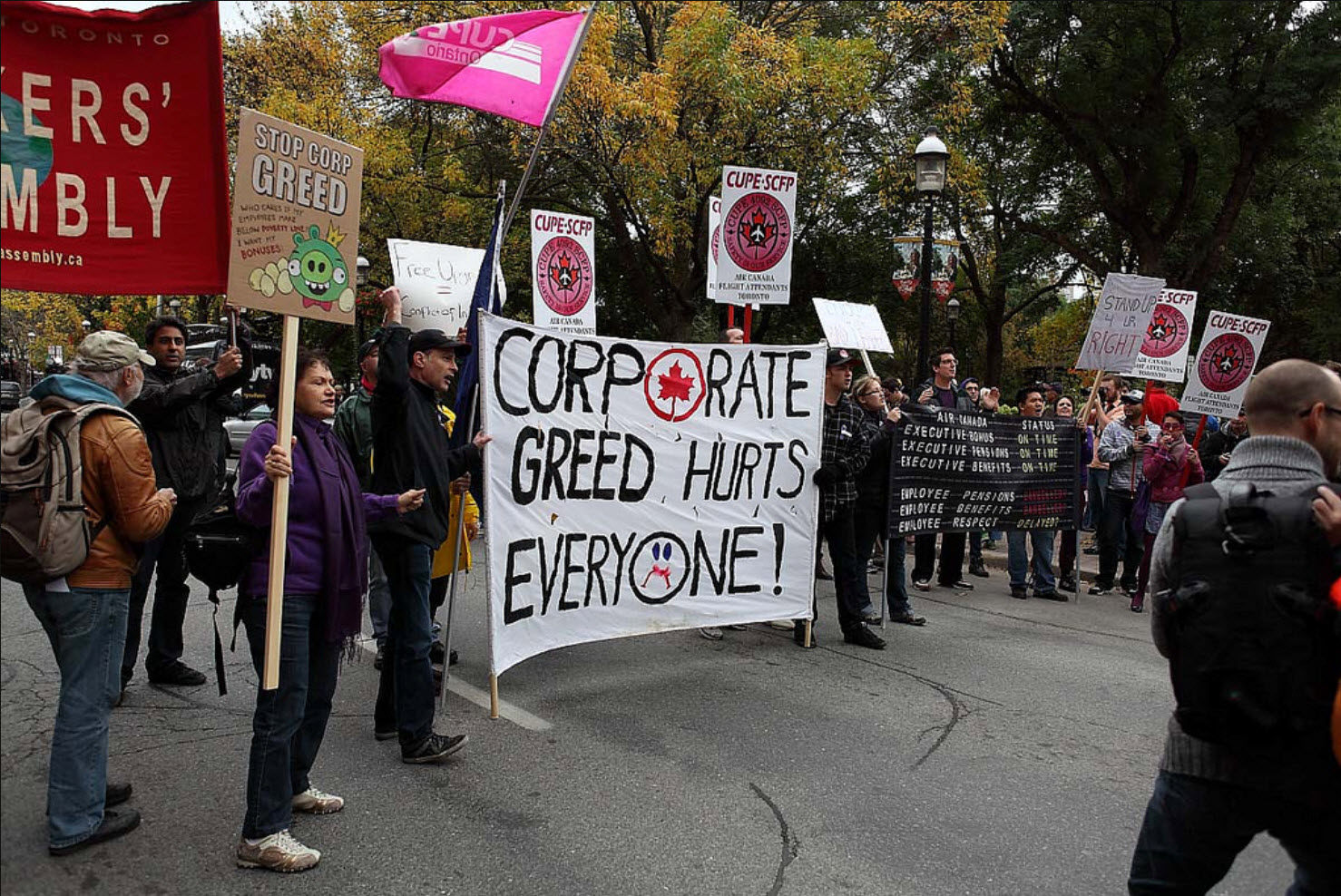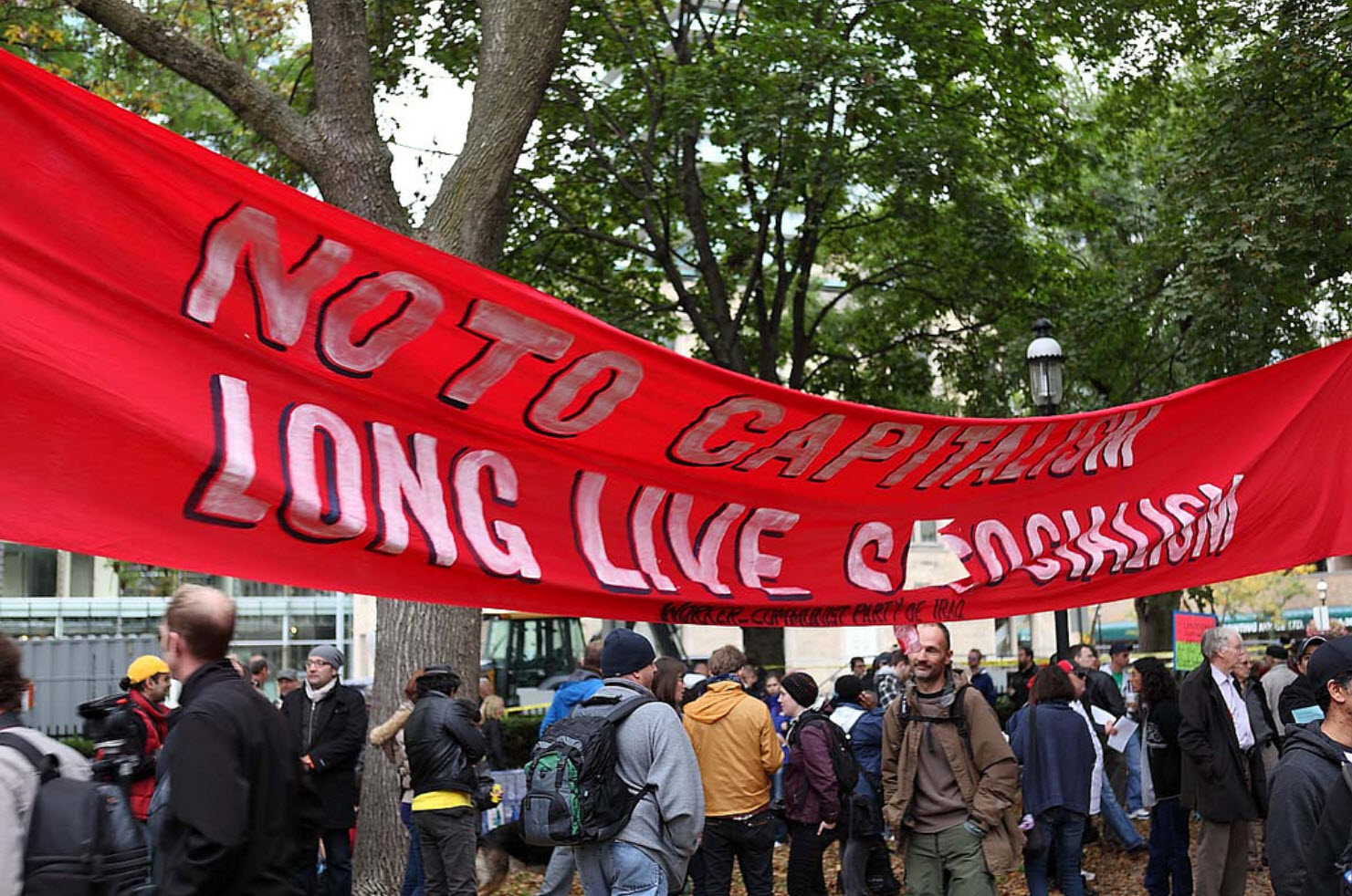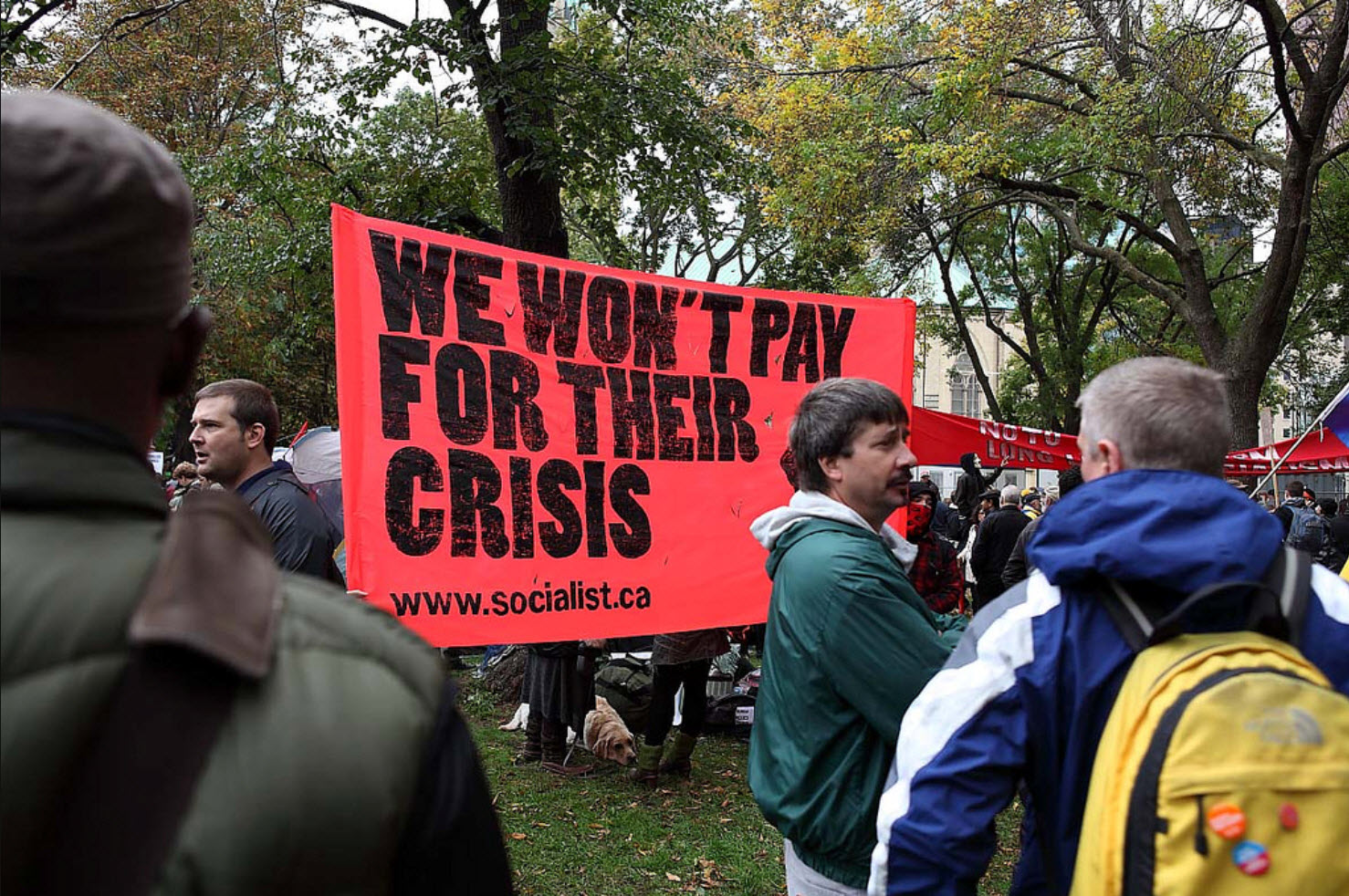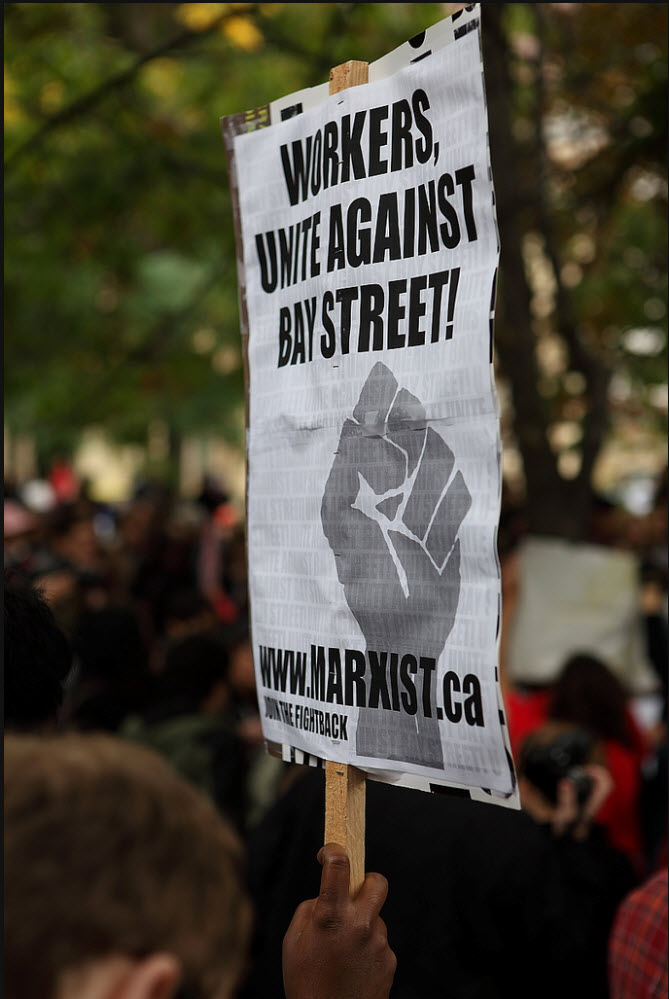





Translation of the banners:
Corporate greed = profitable company.
1917 = Trotskyite revolutionaries = bullet in the back of the head in a dark alley.
socialist.ca = we hate Harper = we hate Capitalism = we love Islam = we have disconnected our brains.
Marxist.ca = socialist.ca is the moderate version of us.
Worker Communist Party of Iraq = Marxist.ca is the moderate version of us.
Bob Rae = a man desperately seeking votes and one of the first against the wall if any of the above get their way.


Corporate greed might equal profitable company for some. Do you think it simply doesn’t exist? Do you think corporations have an obligation to pay a living wage? Ever thought seriously about how difficult it is to make ends meet on minimum wage when you live in Toronto? Have you taken a look at the gas prices lately? You know, the ones that go up by a few cents a litre on the Thursday before a long weekend, and then mysteriously go down again on Sunday afternoon? (Happens like clockwork in Ottawa). Or at the salaries of CEOs who make absolutely ridiculous amounts of money for the work they do? My accountant husband was fired *three times* for refusing to do grey area almost illegal things with the company books.
It’s easy to poke fun at people like these, David. That doesn’t mean that we don’t have serious issues to look at here in Canada.
If I may be so bold as to borrow a phrase from Churchill…
“Indeed, it has been said that democracy is the worst form of government except all those other forms that have been tried from time to time.”
Much the same can be said of our economic system. It is far from perfect, and much can be improved, but it is still the best one yet. And although we may gripe and complain about gas prices, the low amount of minimum wage, and the amount of money that other people are paid, the simple fact is that we enjoy the highest levels of education, the best health, and the highest standard of living the world has ever seen. The western democratic industrialized countries are still the undisputed best places to live, ever!
What the socialists, marxists, and communists that are “demostrating” don’t understand is that their systems were already tried, and failed misserably.
The unrestricted free market hasn’t done all that well in the US, has it? Why do you think our economy is in better shape? Could part of the reason be our more strict regulations?
I’d love to have you shadow me on street outreach sometime. The homeless people I know don’t enjoy that ‘highest standard of living’ you are talking about – nor do the people who are struggling to get off welfare, or the ones who are being paid $10.25 an hour in a town (Ottawa) where you can’t find a bachelor apartment for under $800 a month.
There are some who argue that too much government interference – of the sort that would appear to meet your approval – was at the root of the US financial crisis:
David, even Prime Minister Harper has been quoted as saying that the US regulations are “totally inadequate”. And I’d still like to engage you in conversation regarding the points I made in my first comment.
If you insist.
I think “corporate greed” is a meaningless concept. “Greed” is a failing of individuals not collectives and it afflicts the wealthy and poor alike.
It depends what you mean by “living wage”. The very lowest wages earned in Canada would be a fortune for 90% of the world’s population. Also, what do you mean by “obligation”? Why is a corporation obliged to do anything? To whom are they obligated? Is there a natural moral law that is applicable to corporations as distinct from the one that applies to individuals?
Yes. Have you ever thought that the political systems represented by those protesting tend to make it difficult for everyone to make ends meet?
Do you suppose that those who set themselves the task of limiting the salaries of those they deem corrupt would be any less corrupt themselves?
Good for him, but I can’t see the relevance to this. If your point is that there is corruption in business – good grief, I’ve worked in big business for the past 45 years; thank you for the enlightenment.
Greed can be a failing of corporations. Corporations have cultures, and greed can effect them. By living wage, I mean a wage that you can live comfortably on without having to go to the food bank at the end of the month. The fact that our lowest wages would be a lot of money to 90% of the world is completely irrelevant. We don’t get to work in Toronto and then take that money and live in the third world. What is relevant is wage over and against the cost of the basics. By obligation, I mean just that, obligation. Is it ok for corporations to make a lot of money by underpaying their workforce? Are you against minimum wage laws?
I’m not advocating Marxism or Communisim. I do have some sympathy for what *some* of these protesters are saying.
No disrespent intented Kate but…
blaming big business for the poverty in this country and the world is placing blame against the wrong people.
Big business:
create untold numbers of jobs, most of which pay very livable wages, and
create most of the wealth in this world that is distributed to individual people (wages) and governments (taxes).
Without big business the governments would not be able to afford, well pretty much anything. Including public schools, socialized health care, public pension plans (CPP in Canada), employment insurance, police fire ambulance and other emergency services, roads, parks, etc, etc, etc.
Of course big business is not without its faults. For example, visit any Walmart and try to find clothing made in Canada (or the USA). But that is more our fault as consumers instead of the executives of Walmart. This is because when we go shopping we almost never look at where something was made, but almost always choose the lowest priced item. These choices that we make as consumers sends a very clear message to the executives that run the big businesses. The people are more concerned about price than social justice.
Finally, not intending to sound hard hearted, but the individuals on welfare, and those working for minimum wage should also shoulder some of the responsibility for their situation. Especially when we consider the numerous opportunities available to people to better themselves and make themselves “more employable”. Of course most of these opportunities are in the form of government programs that are funded by the taxes paid largly be big business.
I’m not blaming big business – I’m asking the question, do they have an obligation to pay a living wage?
You do sound hard hearted to me. You haven’t met the people I’ve met, AMP. For some of them, just getting through a day a in one piece is an amazing testament to their courage and strength. There aren’t as many ‘opportunities’ as you might think, and the hoops you have to jump through to avail yourself of them would be daunting to those of us who have grown up priveleged. I know a guy who knew how to make a meal at the age of five, because his parents were IV cocaine users. Another outreach worker I know, has a street friend who was thrown through a plate glass window when he was a small boy. Responsibility to better themselves? I think it is amazing that some of them manage to survive.
So, if only all the people making minimum wage would pass up the inexpensive stuff made off shore (by people making slave-labour wages) and buy the more expensive Canadian- and US-made stuff all would be good? I should have thought of that myself. And finance firms who who gamble with enormous sums of money, and then demand bailouts when their gambles fail – even though they’ve wreaked havoc on economies world wide – are in the same category as companies that produce stuff essential to living? They’re all just “big business”?
Yes, you sound very hard-hearted.
I just realized that I’ve sounded pretty angry on this thread. I’m sorry, guys, I didn’t mean to, I honestly just wanted a real conversation about some of the issues underneath Occupy Wall Street. The thing is, I’ve been doing street outreach in Ottawa for a long time – and these issues, for me, have people’s faces attached to them.
Speaking for myself, no worries – nothing wrong with feeling strongly about something.
I fully understand how you feel. When you can identify real individuals the issue can become “personal”.
Also, from my perspective, it is all too easy to relate to statistics and miss the “human element”.
But I still maintain that those on welfare who can try to do better have a moral obligation to the taxpayer to at least try.
Absolutely. And I would say that many do try. It is very difficult when you have no support system, or an addiction or a mental illness.